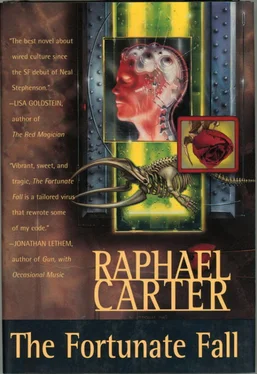Raphael Carter - The Fortunate Fall
Здесь есть возможность читать онлайн «Raphael Carter - The Fortunate Fall» весь текст электронной книги совершенно бесплатно (целиком полную версию без сокращений). В некоторых случаях можно слушать аудио, скачать через торрент в формате fb2 и присутствует краткое содержание. Город: New York, Год выпуска: 1996, ISBN: 1996, Издательство: Tor Books, Жанр: Киберпанк, на английском языке. Описание произведения, (предисловие) а так же отзывы посетителей доступны на портале библиотеки ЛибКат.
- Название:The Fortunate Fall
- Автор:
- Издательство:Tor Books
- Жанр:
- Год:1996
- Город:New York
- ISBN:0-312-86034-X
- Рейтинг книги:3 / 5. Голосов: 1
-
Избранное:Добавить в избранное
- Отзывы:
-
Ваша оценка:
- 60
- 1
- 2
- 3
- 4
- 5
The Fortunate Fall: краткое содержание, описание и аннотация
Предлагаем к чтению аннотацию, описание, краткое содержание или предисловие (зависит от того, что написал сам автор книги «The Fortunate Fall»). Если вы не нашли необходимую информацию о книге — напишите в комментариях, мы постараемся отыскать её.
“Gripping…. One of the most promising SF debuts in recent years”.
—“Publisher’s Weekly” starred review
The Fortunate Fall — читать онлайн бесплатно полную книгу (весь текст) целиком
Ниже представлен текст книги, разбитый по страницам. Система сохранения места последней прочитанной страницы, позволяет с удобством читать онлайн бесплатно книгу «The Fortunate Fall», без необходимости каждый раз заново искать на чём Вы остановились. Поставьте закладку, и сможете в любой момент перейти на страницу, на которой закончили чтение.
Интервал:
Закладка:
“‘Katya, I love you.’
“‘I’m sorry, Pavel,’ she said gently, tears threatening in her eyes. And that was an honor, I realized: she had strung along our band of dissidents with a series of convenient fictions, but now, even now, she would be honest with me.
“She uncorked the flask and carefully poured a little of the clear, sweet water from it into the socket in my head. For a fraction of an instant after that I could still see her, tipping her own head to receive the water, and drawing the flask toward it; and a guard shouting and lunging; but I could not tell who would be the quicker. And after that, for a long time, I remember nothing more.”
Ten
MY MAN SUNDAY
Voskresenye looked down at his plate, hoping, I supposed, that there would be something left to give him an excuse for pause. The white china was clean. He looked up and tried to catch the waiter’s eye, to no avail. His right hand made strange clockwork-spider movements that I supposed were his version of fidgeting. The awkwardness, more than anything else, persuaded me that some part of his story was authentic—that’s how people act when they realize they’ve revealed more than they wanted to. Even so, his story was more smoothly chronological than it had any right to be. I found myself wondering how long he’d rehearsed it, how much he’d embellished it, how much of it was true.
Voskresenye stared wearily at the waiter’s receding back. “Do you know what was on the waiter’s tombstone?” he asked.
“What?”
“‘By and by, God caught his eye.’”
I smiled politely. “What happened to her?” I asked, as gently as I could.
His hand grew still. “I have never known. I can only hope that, because she was more deeply wired than I, she died quickly. But there are no records—if there ever were any, the Army destroyed them. Certainly she did not survive the camps; after the war, I searched most thoroughly. But I will never know exactly how she died.”
“And you?”
He touched his forehead with his fingertips. “The shock traveled down along the wires and into the implants, burning away the very functions that my wiring had enhanced. It damaged my language centers: Broca’s area, Wernicke’s area, angular gyrus. It scorched my visual cortex. It nearly severed my corpus callosum. But worst of all, I lost the ability to form memory traces. So for the next three years, the last thing that had happened was the moment when Katya Andersohna poured her flask of water into my head.”
“What was it like? That time?”
He closed his eyes, and said at last: “You set me a pretty problem. How can I remember what it is like not to remember? If I think I recall sensations—falling through the dark, and reaching out, again and again, and brushing a handhold but not quite being able to grasp it—how shall I trust the memory? All I can tell you for sure is that when I began to wake, I was like a man who has been walking across ice for so long that he does not trust the ground to hold him. When I turned my attention away from a thing, I was surprised that it persisted in my mind. And gradually I realized who I was, and where I was. I was Voskresenye—that was the name he had given me; and I was playing chess with Aleksandr Derzhavin.”
“Oh, I see. Not Voskresenye, Voskresen i ye. He named you ‘Resurrection.’”
Voskresenye shook his head. “No. He named me ‘Sunday.’ He identified his subjects by the dates on which they came to his laboratory. Those of us he spent the most time with soon acquired some shortening of our dates as a nickname: Voskresenye, Fevral, Aprel, Chetverg.” Voskresenye’s eyes grew thoughtful. “Whether he saw the pun available to him by changing a soft sign into an ‘i,’ whether that pun did not lead to his choosing me—that is something I have wondered for a long time. If he did know, then all my calculations with respect to him were based on a false premise. But those calculations proved right, many times, so I don’t think he did know; although, in his own way, he was not humorless.”
“You said you woke already playing chess with him—you were doing this while still brain-damaged?”
“I was imprecise. Behold the dangers of Russian, which forces me to say ‘I played chess,’ when what I mean is more complex. We should be having this discussion in Sapir, whose verb forms are less dogmatic. In Russian, only barbarisms—‘I was played at chess,’ ‘chess was played through me.’ Until that moment of awakening I was merely an eccentric interface for Derzhavin’s… well, say computer, for now; that was what he always called it. When I first became aware of my surroundings, I realized that my hands had been moving the pieces for some time. Yet I could not understand the moves I was making, or even tell who was ahead. I barely knew the rules of chess; to me it was just a quaint pastime of strange old men at tables in cafes.”
He put his palms down on the table, thumbs in, as if marking off the corners of a chessboard: so that pepper, salt, and sugar became dark king and white queen and pawn, locked into their final and fatal embrace. I blinked slowly to show that I understood, but declined to belabor the joke.
“Then,” he said, “I began to notice a voice in my ear that was whispering symbols, so fast I couldn’t follow them. I listened closely, and the voice slowed down. My heartbeat slowed, too—or rather, as I realized later, my thoughts were becoming faster, so that everything else seemed slow. When I listened to the voice again I understood it: it was listing moves, devising strategies, anticipating responses. I looked at the board and it burst into life, the pieces seething and roiling, like bubbles in a boiling pot. They moved faster and faster; the patterns of black and white merged into an incoherent gray, like static on a TV screen. Then something drove itself into the center of my brain, splitting me into halves. Suddenly the board was still, and all possible chains of moves existed simultaneously. I looked up at Derzhavin. From him too I could see sequences of actions branching forth, and in his head, patterns of possible thought looped and twisted—trails of light. ‘Well,’ he said, ‘welcome to the world, Voskresenye.’ I knew the words before he spoke them.
“‘Do you want to finish the game?’ he asked. ‘Or would you rather have a tour of the laboratory?’
“I looked down at the board again. Its futures were already charted, and all were variations on a theme; they held no interest. The rooms around me branched out in a bramble of unlikelihoods that tempted me much more. And just beyond the door behind me, a shadow blanketed the light: a secret, something important that I did not know. I grasped the first thread that led into it. I tried to stand.
“‘No, please, don’t!’ he said, putting his hand on my shoulder. I had foreseen that reaction, but I knew this line of play would bring the shadow into view. ‘Look at your hands.’ I did, and saw them as they are now, half-mechanical. But I had known that already. He was trying to see whether I could access memories from before my awakening. I kept my face carefully blank, to frustrate his deductions.
“‘I didn’t expect you to wake so soon,’ Derzhavin explained, ‘so I haven’t done your legs yet. It will be my next task, I assure you. But for now, I’ll have to wheel you in the chair. What do you want to see first?’
“‘Show me the other half of myself,’ I said, and then, although he could not understand, I added, ‘I think that’s the shadow.’
“He turned the chair around, and we followed the cables that trailed from my head and spine into a long corridor. There were cages on either side. As we passed—slowly, since the chair was heavy—I looked at the people huddled fearfully in the cells, or lying on their cots as if dead. Derzhavin made no explanation; he seemed unaware of the effect their presence had on me. Instead he spent the time apologizing to me for the cable, explaining that he intended to replace this crude umbilical cord with radio transmissions once, as he put it, ‘the system was debugged.’
Читать дальшеИнтервал:
Закладка:
Похожие книги на «The Fortunate Fall»
Представляем Вашему вниманию похожие книги на «The Fortunate Fall» списком для выбора. Мы отобрали схожую по названию и смыслу литературу в надежде предоставить читателям больше вариантов отыскать новые, интересные, ещё непрочитанные произведения.
Обсуждение, отзывы о книге «The Fortunate Fall» и просто собственные мнения читателей. Оставьте ваши комментарии, напишите, что Вы думаете о произведении, его смысле или главных героях. Укажите что конкретно понравилось, а что нет, и почему Вы так считаете.












